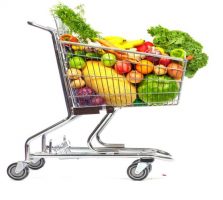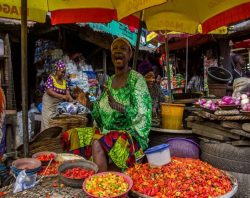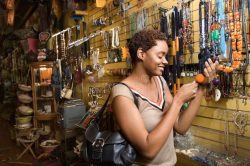You’re approaching a local store and immediately remember you may need to get more cans of your favorite drink or just another pack of water because the sun has been “sunning” and hydration has become more important than ever, but you also remember you’ll be doing grocery shopping at the “big” mall in a few days, so it’s a worthy excuse to put off the runs for later.
We’ve all fallen for this innocent move, and although it seems like the simplest and all-in-one solution, here’s what happened in those few minutes: We added one more diversion to the millions of already existing ones for pumping more money into foreign economies while opening up a channel for the exhilarating “God when?” phrase as well as a reason for more prayers for the “state of the country”, which most people describe as “languishing.”

Before we move on, let me briefly address another area of which I am particularly guilty. I live in Lagos, and up until I took this study project, I never used the local ride-hailing service known as Lagride since I believed it was simply another government copycat scheme to “rip” us.
The services of foreign-owned uber are outstanding, and the prestige associated with them keeps them in first place, but here’s what we don’t pay attention to: in most cases, when profit is made, the money that flows out in associated to the economies of the foreign country or countries with them is far more than what remains in our economy for repurposing, but when patronizing local, the percentage of money that remains is typically higher because it mostly goes back into the pockets of locals as it is a local venture.

If you’re wondering why this is essential, it helps us understand the benefits of seizing every need to boost our economy whenever possible rather than ignoring these opportunities because we don’t understand why.
Many of us fail to view it from this angle because we believe that economic leakage only occurs when people spend money in foreign nations or invest heavily in them, despite the fact that these more frequent financial diversion loopholes, which a larger number of Nigerians easily fall into, account for a significant portion of the leakage percentage.

If we looked more closely at the places we visit frequently, such as our favorite restaurants, shops, and other establishments, we would notice that it goes beyond the satisfaction we experience from the excellent services and aesthetics to the state it leaves our neighborhood business owners with– a marginalized share of the market. Imagine that a new company opens in your neighborhood, and you think, “Now I have more options!” What about the flip side, though? As a greater portion of these funds flow into the economies of the foreign owners because, of course, more will be done to better their own country and ours receives less cash flow. Rinse and repeat.

Yes, we can’t exist in isolation, and yes, these businesses’ operations help our economy; thanks to the benefits of global trade, but we can also strike a healthy balance. Let’s say you remember something you need right away; rather than delaying your purchase until you visit other businesses, you can take advantage of the chance to support your country’s economy by patronizing locally targeted businesses; Eat at local eateries, invest in local companies, visit local tourist attractions—in general, just make sustainable consumer decisions so that in praying and hoping for a better Nigeria, we are not the weapons fashioned against its progress!

 Featured1 week ago
Featured1 week ago
 Crime23 hours ago
Crime23 hours ago
 Crime1 week ago
Crime1 week ago
 Featured1 week ago
Featured1 week ago
 Editorial5 days ago
Editorial5 days ago
 Business7 days ago
Business7 days ago
 Agribusiness3 days ago
Agribusiness3 days ago
 Business4 days ago
Business4 days ago





